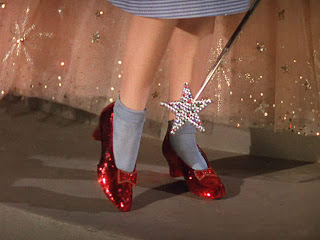- Why Nietzsche was not a nihilist and why you are forever trapped in the Wizard of Oz (part one)
- Why Nietzsche was not a nihilist and why you are forever trapped in the Wizard of Oz (part two)
- Why Nietzsche was not a nihilist and why you are forever trapped in the Wizard of Oz (part three)

Dorothy and her motley crew. Armed with the will to power, these are dangerous intellectuals who undermine the authority of the state.
Why Nietzsche was not a nihilist
This is the third and final part, explaining why Nietzsche claims you may be perpetually trapped in the Land of Oz. At the very least, you are perpetually trapped on the yellow brick road.
- Considering Nietzsche's own testimony of his war method, we find that nihilism has all the characteristics of one of his worthy adversaries. Nihilism is a cause that is victorious. It is a cause against which he would not find allies easily, because his only allies would be deists, and these are hardly friendly with Nietzsche after such exhilarating titles such as Beyond Good and Evil and The Antichrist. It follows that Nietzsche would stand alone if he opposed nihilism, which he did in his writings. In fact, in The Antichrist, Nietzsche calls nihilism the will to nothingness, which is contrasted with the will to power. Nietzsche thus sees nihilism in opposition to the will to power. He identifies nihilism as a natural reaction of the Judeo-Christian perspectives to the notion that God is dead, and claims that nihilism is necessary in order to restore the healthy will to power in the populace.
- Considering the opposition of Apollonian and Dionysian impulses in art, it is easy to equate nihilism with a new world order. Nihilism represents the new Apollonian dynasty. With Nietzsche's methods in mind, it is obvious that Nietzsche would rather be the Dionysus of the new dynasty if the new Apollo already showed its face. Only an Apollo that could withstand the attacks of its Dionysus would be worthy of instilling the master morality of the new generation.
- Considering Nietzsche's radical perspectivism, one finds that Nietzsche acknowledges nihilism as a valid perspective, but he does not think that it is sound. Nihilism claims that there is no purpose to existence. Nietzsche believed in eternal recurrence. Eternal recurrence is a kind of determinism, meaning we don't really have free will. Eternal recurrence holds that time is infinite, but matter itself is finite. Since matter is finite, the exact combination of matter is likely to occur several times during the course of infinite time. With regards to the yellow brick road, nihilism says there is no point in moving either way along the yellow brick road. The thought of eternal recurrence holds that if we equate the yellow brick road with infinite time, the yellow brick road would extend forever beyond and before the Emerald City. In such an universe, it is likely to encounter the nihilists sitting on the side of the road, claiming the road leads nowhere. It is likely to encounter several Dorothies at various points along the road, and these various points would all be exact replicas of the Land of Oz. In other words, Nietzsche inverts the nihilistic notion that the yellow brick road leads nowhere and claims instead that the yellow brick road leads everywhere else.
- Considering Nietzsche's theory of master and slave moralities, one could deduce that Nietzsche's purpose is to test all master morality of the next generation. His perspective offers the hindsight of nihilism and Christianity, with its dogmatic requirements of the supernatural and of objective morality. Since these values are attributes of the fallen master moralities of old, Nietzsche rejects them outright. These values are too close for comfort to the values of the wizards who were already behind the curtain, and thus neither nihilism nor Christianity are worthy of pulling the levers in the sequel to the Wizard of Oz.

The Emerald City on the horizon. Eternal recurrence claims we may be forsaken to return to the Land of Oz. Forever.
In conclusion, it is clear that Nietzsche's notions of the will to power, the opposition between Apollonian and Dionysian impulses in art, the struggle between master and slave morality and eternal recurrence are incompatible with a nihilistic world view. His concepts of the übermensch and the last man represent two possible reactions to nihilism, with the übermensch being one that successfully transcends the pessimism of Schopenhauer by utilising the will to power and the last man being one who falls prey to nihilism, the will to nothingness. The last man is tired of living, he takes no risks, he sees no solutions, he seeks comfort and security. In contrast, the übermensch sees utility in place of the last man's futility.

Ruby slippers. Futility for the last man. Utility for the übermensch.
Sources consulted
- Tad Beckman's course notes on The Antichrist, one of Nietzsche's most controversial works.
- Wikipedia page on nihilism. Also claiming Nietzsche was critical of nihilism.
- Wikipedia page on determinism. Wikipedia is free, but not as free as you might think.
- Wikipedia page on eternal return, with an explanation of Nietzsche's eternal recurrence.
- Wikipedia page on the philosophy of Friedrich Nietzsche, also contradicting the opinion that Nietzsche was a nihilist.
- Wikipedia page on Arthur Schopenhauer, with his will to live.
- Wikipedia page on The Wizard of Oz, the film not the book.


2 comments:
You are really an excellent writer. I rarely feel compelled to say that. :)
Nice blog, full of good infos, keep the good work going.
Post a Comment